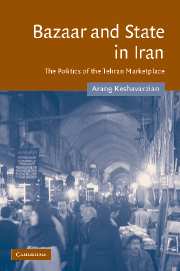Book contents
- Frontmatter
- Contents
- List of maps
- List of figures
- Acknowledgments
- Note on transliteration
- Map of Iran
- 1 The puzzle of the Tehran Bazaar under the Pahlavi monarchy and the Islamic Republic
- 2 Conceptualizing the bazaar
- 3 Bazaar transformations: networks, reputations and solidarities
- 4 Networks in the context of transformative agendas
- 5 Carpets, tea, and teacups: commodity types and sectoral trajectories
- 6 Networks of mobilization under two regimes
- 7 Conclusions
- Selected bibliography
- Index
- Cambridge Middle East Studies
6 - Networks of mobilization under two regimes
Published online by Cambridge University Press: 22 September 2009
- Frontmatter
- Contents
- List of maps
- List of figures
- Acknowledgments
- Note on transliteration
- Map of Iran
- 1 The puzzle of the Tehran Bazaar under the Pahlavi monarchy and the Islamic Republic
- 2 Conceptualizing the bazaar
- 3 Bazaar transformations: networks, reputations and solidarities
- 4 Networks in the context of transformative agendas
- 5 Carpets, tea, and teacups: commodity types and sectoral trajectories
- 6 Networks of mobilization under two regimes
- 7 Conclusions
- Selected bibliography
- Index
- Cambridge Middle East Studies
Summary
Under the Shah, the bazaar could wreck the regime if it decided to close down for three days. But … the bazaar is not the bazaar any more, it's just a name, a symbol.
Carpet seller, Tehran Bazaar, February 2000I had recently arrived in Tehran to conduct exploratory research for my dissertation. It was July 1999, a time when the students at Tehran University were in the midst of challenging the judiciary for banning Salam, a leading independent newspaper that called for political reforms. As the Persian expression goes, “The university was sholugh,” meaning that there was political dissent and disorder. Tehran was in the throes of the largest political protests since the revolution that had swept aside the Shah. The pro-reformist protests had spread to campuses in Tabriz, Isfahan, Shiraz, and other cities. With President Mohammad Khatami having recently defeated the candidate believed to be the regime insider in a surprising landslide victory, supporters of the newly forming reformist platform were hopeful and energized. For supporters of reform the mass protests only boosted their expectations; for beneficiaries of the status quo, the students' vociferous daring was horrifying.
When I went to buy groceries, the corner grocer, who liked to chat about the newspaper headlines, smiled and beckoned me over. Knowing that I visited the Bazaar, he asked, “So you go to the Bazaar. Tell me, is the Bazaar sholugh?” I answered that it was not, and we were both surprised.
Information
- Type
- Chapter
- Information
- Bazaar and State in IranThe Politics of the Tehran Marketplace, pp. 228 - 269Publisher: Cambridge University PressPrint publication year: 2007
